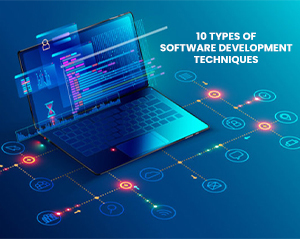
Close



If you're trying to hire a software development company, you're presumably looking to produce a product or products, such as an app, a website, or a programme. But, before you start looking, you need to figure out what you're seeking for beyond what you're building.
There are numerous kinds of software development. Various types of developers frequently collaborate to bring your idea to reality. Here are just a few of the countless options. Some overlap and can be found in a single professional, while others necessitate a different skill set.
Frontend developers work on the portion of the product that the user interacts with. They are preoccupied with the user interface (UI). They might, for example, design the layout, visual characteristics, and interactive parts of a website or app. However, their role is not the same as that of a user interface (UI) or user experience (UX) designer. They also patch problems and ensure that the UI works in different browsers.
They must be very skilled in programming and collaborate closely with backend developers to guarantee that the two components of the product work in tandem.
A backend developer, on the other hand, works on the component of the product that users cannot see - the back end. This professional creates the architecture that supports the website, app, or programme, with a focus on functionality, system integration, and fundamental logic. They will also deal with the sophisticated underlying structure, which will ensure high performance, scalability, and security.
As previously stated, frontend and backend developers collaborate closely to generate a final product.
A full-stack developer is responsible for the entire product, including the front and back ends. To be a successful full-stack developer, you must have excellent programming skills as well as a number of soft skills required of all tech workers, such as problem-solving and critical thinking. At the end of the day, you — and possibly your team — are accountable for producing a complete, finished product.
Desktop developers only work on applications that run on desktop operating systems like Windows, Mac, or Linux. This is in contrast to developers who make applications for mobile, tablet, or other devices.
This form of specialization was more common in the early days of programming, before mobile applications. They do, however, have a place in today's landscape.
The process of creating web applications is known as web development. These apps are accessed via an internet browser on a variety of devices. A mobile app, on the other hand, operates on a phone or tablet and does not necessarily require an internet connection to function.
Web development is a broad word that includes both frontend and backend development. Full-stack web developers can also be professionals.
A database developer is responsible for building the database, modifying and designing existing or new programmes, and ensuring that they satisfy the requirements of the users. This is not to be confused with a database administrator, who typically works with daily database upkeep and troubleshooting and implements the system. The jobs of database administrator and developer might often overlap, depending on the needs of the client or business.
A mobile developer, as the name suggests, creates programmes that operate natively on mobile devices such as smartphones, tablets, and some types of wearables. These individuals will typically specialize in either iOS or Android programming, but not both.
It is feasible to use both operating systems. Many businesses, though, will collaborate with developers that are experts in only one. Because the tools, frameworks, and languages are distinct, they are more informed about the complexities of each sort of programming than individuals who dabble in both.
Cloud computing refers to cloud-based services, programmes, and applications. That is, they may be accessed remotely from virtually any location as long as the user has an internet connection and a valid login. They have numerous advantages, including scalability.
Some developers specialize in cloud computing, or the development of cloud systems. They will create cloud applications, enable cloud deployment and migration, administer cloud services, and provide user support.
DevOps is a set of methods and ideas aimed at delivering software in a timely, efficient, and customer-centric manner. This style, which is related to Agile, has been widely adopted by software engineers and teams all around the world.
DevOps engineers collaborate with teams that follow the concepts. They take part not just in the product's creation, but also in quality assurance (QA) testing and eventual deployment. They must have a diverse set of talents, including programming, integration, scripting, QA testing, and others. They must also combine theory and practice in order to support and collaborate with the rest of the team, which may include software developers and quality assurance professionals.
In this day and age, everyone understands the need for software security. Security software professionals work to ensure the safety of diverse technical systems. They must be well-versed on the methodology, methods, tools, and patterns used by cybercriminals to hack software in order to aid in the prevention of such assaults.
One example of this kind of skill is ethical hackers. They collaborate with clients to attempt to hack software in order to identify and reveal flaws, allowing them to repair them before hackers exploit them.
This is by no means an exhaustive list of all sorts of software development – the subject is vast and diverse. However, these are some of the most crucial characteristics to consider when hiring developers and development teams to work on your next project – and construct a high-quality product.
We have all of your software development requirements covered. Hire us to satisfy your requirements and also to discuss your thoughts on software development.